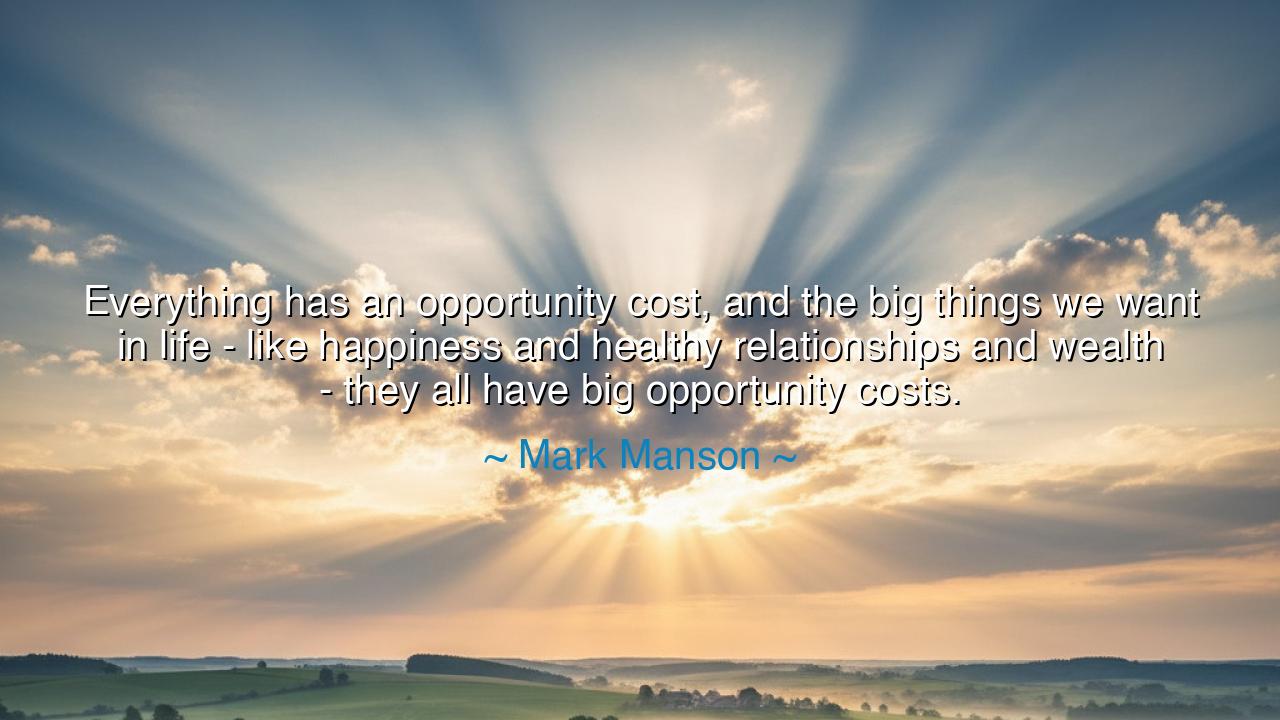
Everything has an opportunity cost, and the big things we want in
Everything has an opportunity cost, and the big things we want in life - like happiness and healthy relationships and wealth - they all have big opportunity costs.






“Everything has an opportunity cost, and the big things we want in life — like happiness and healthy relationships and wealth — they all have big opportunity costs.” — Thus spoke Mark Manson, philosopher of the modern age, whose words, though born in contemporary thought, echo the timeless wisdom of the ancients. His teaching is simple, yet profound: nothing in life is gained without sacrifice. To desire is easy; to choose is divine. For every path we take, countless others must be left behind — and therein lies the cost of greatness, of love, of happiness itself.
The ancients understood this truth well. In every choice, they saw the invisible law of exchange — the law that binds all things in balance. The Greeks called it “Kairos,” the moment of decision, where one’s fate is sealed not by the gods, but by one’s own willingness to let go of lesser things in pursuit of greater ones. To achieve wealth, one must surrender comfort and risk loss. To find love, one must risk heartbreak and vulnerability. To attain wisdom, one must sacrifice ignorance — and the peace that comes with it. Manson reminds us that we live not by what we gain, but by what we are willing to give up for what truly matters.
In the age of abundance, this truth is easily forgotten. The modern heart desires all things at once — success without toil, pleasure without pain, commitment without sacrifice. But life does not bend to our greed; it demands payment for every treasure it bestows. A man may chase wealth, but he will trade his time and peace to obtain it. Another may pursue happiness, but must abandon bitterness and pride. There is no victory without loss, no fulfillment without surrender. This is the sacred paradox of existence: that every blessing has its price, and to refuse that price is to live forever in the shallow waters of mediocrity.
Consider the tale of Alexander the Great, whose name thundered across the ancient world. He conquered nations, crossed deserts, and built an empire that stretched from Greece to India. Yet at the end of his short and burning life, he found himself alone — surrounded not by friends, but by ambition’s ghosts. He had achieved greatness, but at the cost of peace. His opportunity cost was not measured in gold or territory, but in the quiet joys he forsook — the simplicity of home, the laughter of companionship, the serenity of stillness. Thus, his story stands as both triumph and warning: that to gain everything is also to lose much, and wisdom lies in knowing what to lose and what to keep.
So too, in the realm of relationships, Manson’s words ring true. Love, that most delicate of treasures, demands the surrender of pride, the patience of forgiveness, and the courage to be seen as we are. Many yearn for its sweetness but flee its cost — the work, the compromise, the risk of pain. Yet love, like all things of worth, cannot bloom without sacrifice. The wise learn that true connection is not found by demanding perfection, but by giving of oneself freely, even when it hurts. Thus, the cost of healthy relationships is not freedom lost, but ego relinquished — and in that loss, the soul gains abundance.
The essence of Manson’s teaching is not to frighten us with the weight of life’s choices, but to awaken us to their reality. Every dream exacts its toll, and those unwilling to pay it wander in perpetual dissatisfaction. The one who desires all paths walks none; the one who fears loss never truly gains. Happiness is not found in escaping cost, but in choosing which cost is worthy of your sacrifice. To live wisely, therefore, is to decide — again and again — what matters most, and to let the rest fall away.
The lesson, then, is this: count not the things you wish for, but the prices you are willing to pay. When you set your heart upon greatness — whether in wealth, wisdom, or love — prepare also to bear its burden. Do not curse the cost, for it is what gives value to the goal. The diamond is precious because it resists all who try to cut it cheaply. In the same way, happiness is rare because few are willing to suffer for it.
So remember, my child: life is a trade, not a gift. Each moment demands a choice — and each choice defines your destiny. Ask not, “What do I want?” but rather, “What am I willing to give for it?” Choose your sacrifices with clarity and courage, for they will shape your soul more deeply than your triumphs ever will. And when you have paid dearly for what you love, you will understand the sacred truth behind Manson’s words — that the cost of everything is high, but the reward of choosing well is nothing less than a life worth living.






AAdministratorAdministrator
Welcome, honored guests. Please leave a comment, we will respond soon